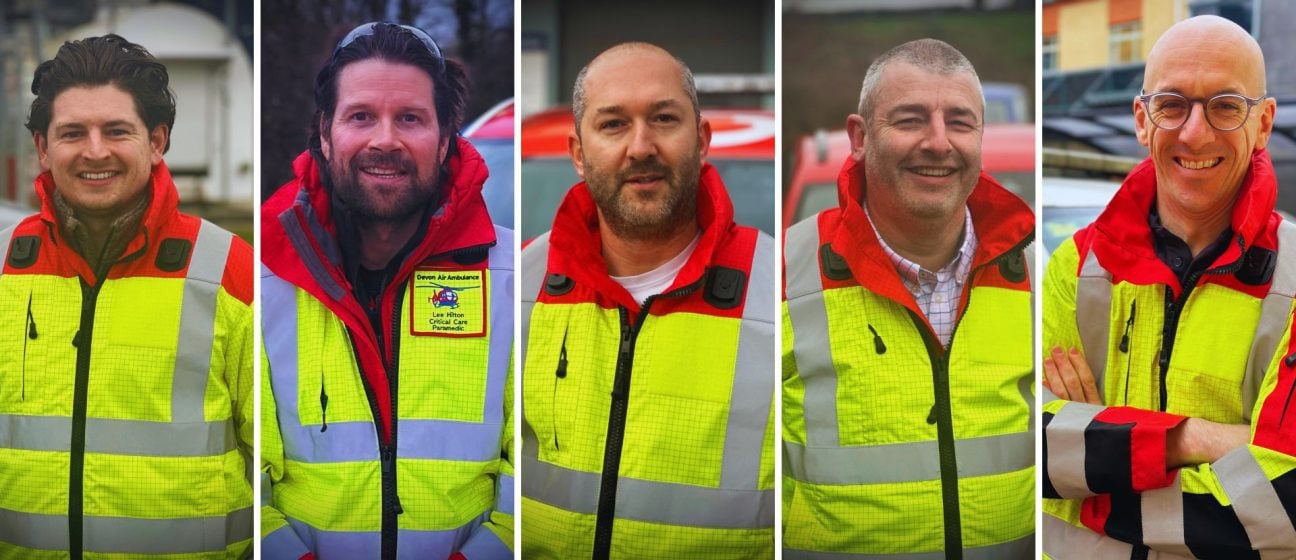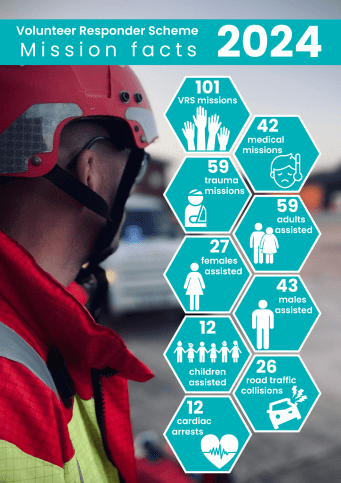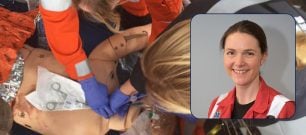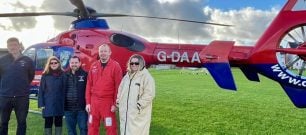
Paramedic, Lee, discusses the impact of the Volunteer Responder Scheme two years on.
Lee Hilton Advanced Prehospital Practitioner and Volunteer Responder Scheme Lead, shares some updates on the scheme.
In summer 2022 we introduced a scheme where a number of the clinical team could volunteer a proportion of their time to the enhanced and critical care needs of the people of Devon.
This became known as the Volunteer Responder Scheme. It became clear the development of the role required significant planning and preparation. It was essential that the model, which was originally set up as a twelve-month pilot, was able to demonstrate compliance with governance structures, whilst also proving to be of benefit to our patients.
Originally, three of the team, all Critical Care Paramedics, volunteered as part of the pilot scheme, but a lot has developed since then.
Staffed and equipped
Responding volunteers are equipped with much of the lifesaving equipment that is carried on one of Devon Air Ambulance’s critical care cars and helicopters. The cost of setting up a volunteer critical care paramedic is approximately £5,000 to £7,000. This was funded by the charity, through ongoing donations from members of the public. The vehicles had to be fitted with blue lights and sirens for the purposes of responding safely to emergency calls. It was also necessary for responders to ensure that their personal vehicles were appropriately serviced, insured and inspected so they could be used for emergency responding.
Devon Air Ambulance ensures that responders’ vehicles comply with standards set by the Devon and Cornwall Roads Policing Team. Southwestern Ambulance Service NHS Foundation Trust, who partner with Devon Air Ambulance to run the Volunteer Responder Scheme, ensure that vehicles are inspected regularly alongside their ambulance fleet. The responsibility to insure, service and maintain the volunteer’s vehicle sits with the driver, alongside the decision to claim any road traffic exemptions when responding to a 999 call. All responders are level-three Certificate in Emergency Response Ambulance Driving qualified.
Response-ready
When the responding volunteer is available to respond, they book ‘available’ using the National Mobilisation Application on a mobile phone provided by the ambulance service (pic 1). All calls are then passed to this device by the Helicopter Emergency Medical Service (HEMS) Dispatchers based in the ambulance control room when they identify a patient who is likely to benefit from any of the additional skills offered by a HEMS service. Volunteer critical care paramedics are dispatched in the same way a core Devon Air Ambulance critical care car or helicopter is allocated.
The volunteer responder can provide the same level of care as if they were responding as part of their paid employment. This includes the ability to provide sedation, manage challenging airways, provide surgical interventions at the roadside and support the enhanced care needs for patients, in addition to that available to a paramedic on an ambulance.
When is a VRS team member dispatched?
There are three main occasions when a volunteer responder may be dispatched:
- the responder is much closer than another enhanced or critical care resource, or,
- no other enhanced or critical care resource is available, or,
- the scale of the incident suggests that additional enhanced or critical care resources are required.
Two years on…
The year following the trial year, Devon Air Ambulance and Southwestern Ambulance Service NHS Foundation Trust decided to substantiate the Volunteer Responder Scheme in response to its proven benefit to patients.
The review of the pilot revealed that many patients were provided the enhanced care procedural interventions to support their needs, that would otherwise have been unavailable or delayed, had a volunteer not been available. volunteers also supported ambulance colleagues in other ways. This included scene leadership, supporting complex decision making and facilitating the direction and forward momentum to ensure patients were taken to the right care facility promptly.
Now over two years on, the benefits that the Volunteer Responder Scheme offers our patients continues. We are lucky enough to have increased our volunteer number to five. All members are critical care paramedics, employed by Devon Air Ambulance. As a team of volunteers we have responded to 194 incidents, treating 135 patients in total. Of these patients treated, the Volunteer Responder Scheme was the only enhanced care resource at 82 of these cases. This means that we have been able to offer care to an additional 82 patients that otherwise would not have been supported by Devon Air Ambulance. This is so important when we consider the rural geography of Devon and the need to reach as many patients who require our care as possible.
What's next for the scheme
The next steps for the Volunteer responder Scheme is to continue to grow our service so we are able to reach even more patients who need our care. We hope that in the future we are also able to introduce our critical care doctors to the scheme (something that has not been previously possible due to the driving standards requirement and time taken to achieve this qualification).
It is important for me to conclude with a statement of extreme thanks to our wonderful members of the public. Such innovation would not be possible if it wasn’t for the kind and generous donations that you offer us. So, on behalf of the Volunteer Responder Scheme and wider Devon Air Ambulance Team, a wholehearted thank you!




